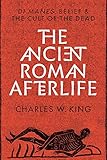The ancient Roman afterlife : di manes, belief, and the cult of the dead / Charles W. King
Material type: TextSeries: Ashley and Peter Larkin series in Greek and Roman culturePublisher: Austin : University of Texas Press, 2020Copyright date: ©2020Edition: First editionDescription: 1 online resource (xxix, 269 pages)Content type:
TextSeries: Ashley and Peter Larkin series in Greek and Roman culturePublisher: Austin : University of Texas Press, 2020Copyright date: ©2020Edition: First editionDescription: 1 online resource (xxix, 269 pages)Content type: - 9781477320228
- 1477320210
- 9781477320211
- 1477320229
- Gods, Roman
- Rome -- Religious life and customs
- Dead -- Religious aspects
- Funeral rites and ceremonies -- Rome
- Rome -- Religion
- Cults -- Rome
- Household shrines -- Rome
- Dieux romains
- Morts -- Aspect religieux
- Rome -- Religion
- Cultes -- Rome
- Sanctuaires domestiques -- Rome
- RELIGION -- Ancient
- Cults
- Dead -- Religious aspects
- Funeral rites and ceremonies
- Gods, Roman
- Household shrines
- Religion
- Rome (Empire)
- 292.2/3 23
- BL805 .K56 2020
- online - EBSCO
| Item type | Current library | Call number | URL | Status | Notes | Barcode | |
|---|---|---|---|---|---|---|---|
 eBook
eBook
|
Biblioteca "Angelicum" Pont. Univ. S.Tommaso d'Aquino Nuvola online | online - EBSCO (Browse shelf(Opens below)) | Online access | Not for loan (Accesso limitato) | Accesso per gli utenti autorizzati / Access for authorized users | (ebsco)2431482 |
Browsing Biblioteca "Angelicum" Pont. Univ. S.Tommaso d'Aquino shelves, Shelving location: Nuvola online Close shelf browser (Hides shelf browser)
In ancient Rome, it was believed some humans were transformed into special, empowered beings after death. These deified dead, known as the manes, watched over and protected their surviving family members, possibly even extending those relatives' lives. But unlike the Greek hero-cult, the worship of dead emperors, or the Christian saints, the manes were incredibly inclusive--enrolling even those without social clout, such as women and the poor, among Rome's deities. The Roman afterlife promised posthumous power in the world of the living. While the manes have often been glossed over in studies of Roman religion, this book brings their compelling story to the forefront, exploring their myriad forms and how their worship played out in the context of Roman religion's daily practice. Exploring the place of the manes in Roman society, Charles King delves into Roman beliefs about their powers to sustain life and bring death to individuals or armies, examines the rituals the Romans performed to honor them, and reclaims the vital role the manes played in the ancient Roman afterlife
Includes bibliographical references and indexes
Di manes : the godhood of the dead -- Di manes : the number of the gods -- Who worshipped whom? -- The manes in the context of Roman religion : beliefs and variations -- The powers of the dead -- The manes in the context of the funeral -- Festivals, ceremonies, and home shrines
Print version record









